Venturing into the great outdoors has its thrills, but staying connected can often be a challenge. For outdoor enthusiasts, portable solar panels are the game-changers, providing an environmentally-friendly source of power right under the sun. This guide aims to demystify the process by diving into the various types of solar panels suitable for camping, how to choose the right one, and the numerous benefits of going solar during your camping expeditions. Let’s explore the empowering possibilities of using solar power for camping.
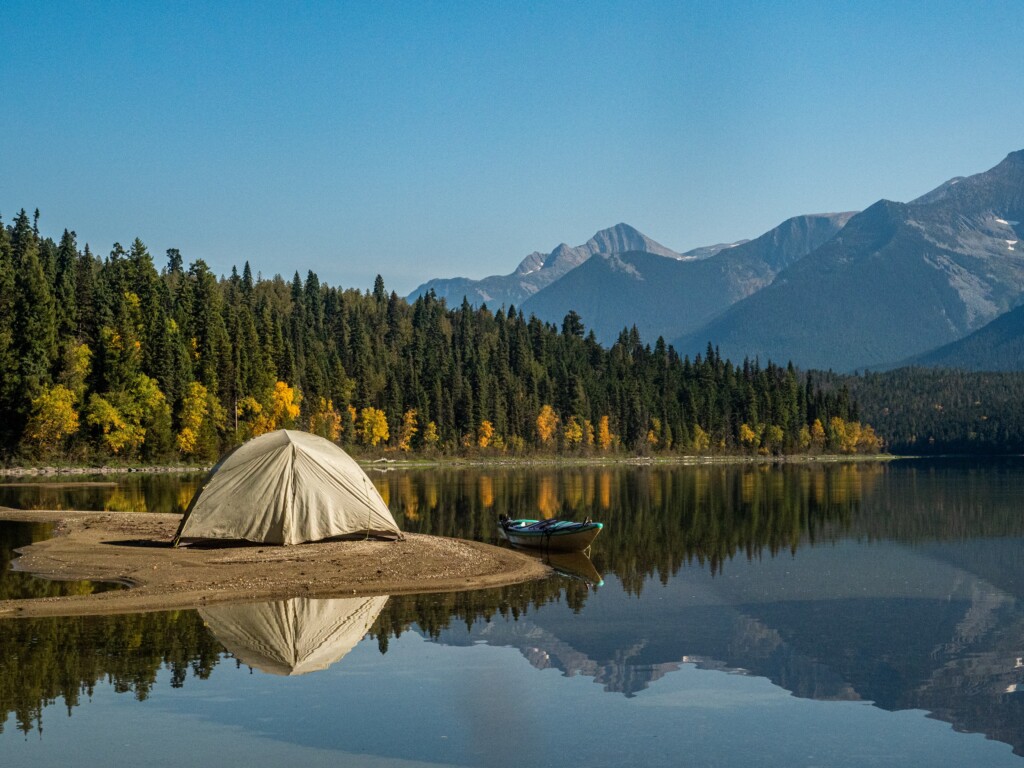
In evaluating the best solar panels for camping, we must first understand the different types available on the market. Here’s an expanded overview:
Rigid solar panels are a prevalent choice among campers and RV enthusiasts due to their high efficiency and durability. Typically made from monocrystalline or polycrystalline silicon, these panels boast an excellent power output. Monocrystalline panels, identifiable by their blackish hue and rounded cells, offer the highest efficiency due to their pure silicon structure. Polycrystalline panels, although slightly less efficient, are more affordable and can be identified by their bluish color and square cells. Despite their bulkier design, their robust construction makes them highly resistant to harsh weather conditions. They’re best suited for fixed installations, such as on the roof of an RV or a caravan.
Portable solar panels are designed with mobility in mind, making them an ideal choice for backpackers or campers who change locations frequently. They can be made from any type of silicon, including monocrystalline, polycrystalline, or thin-film technology. The most distinguishing feature of portable panels is their lightweight and often foldable design. Some models are so compact they can be folded and stored in a backpack. They usually come with built-in stands for easy setup and tilting towards the sun, as well as protective carrying cases to prevent damage during transit. Despite their portability, these panels can still provide a substantial power output, capable of charging devices ranging from smartphones to portable refrigerators.
Solar generators, essentially solar-powered batteries, are an excellent option for campers requiring considerable power without the bulk. These compact, portable units store the power generated by solar panels for later use, making them essential for camping sites with inconsistent sunlight. Solar generators are equipped with multiple ports, including USB and AC outlets, allowing campers to charge a variety of devices such as smartphones, laptops, cameras, and even small appliances. They often come with their own set of portable solar panels, although most models allow for the connection of additional panels for increased charging speed.
A less conventional but increasingly popular option, flexible solar panels are extremely lightweight and adaptable. Made using thin-film technology, these panels are not enclosed in traditional aluminum frames like their rigid counterparts, making them bendable and easy to mount on uneven surfaces. Their flexibility makes them ideal for use on tents, backpacks, or curved RV roofs. Despite being less efficient than monocrystalline or polycrystalline panels, their ease of use and transportability make them an appealing option for campers with lightweight or space-saving needs.
Designed for charging small devices, solar chargers are a type of portable solar panel often used by backpackers or hikers. They are typically compact, lightweight, and designed to charge devices like smartphones, tablets, and small cameras. Some models come with built-in batteries, allowing them to store energy for charging devices even when the sun isn’t shining.
Choosing the right solar panel for your camping trip can significantly enhance your outdoor experience, ensuring you have reliable power access in even the most remote locations. When selecting a solar panel, several factors come into play. Let’s delve into each of these aspects in more detail.
Solar panels’ output varies significantly based on their size, efficiency rating, and type of solar cells used. Understanding your power needs is crucial before making a purchase. The power output you’ll need depends primarily on the devices you plan to charge. For instance, if you’re simply keeping your phone powered during a week-long backpacking trip, a smaller panel with an output of around 6W could suffice. However, if you intend to charge multiple devices simultaneously, like a phone, tablet, and laptop, you may require a panel with a power output closer to 100W.
Additionally, the efficiency rating of the solar cells plays a key role in determining the power output. Panels with higher efficiency ratings can generate more electricity from the same amount of sunlight, making them more powerful and potentially more cost-effective in the long run.
Size and weight are crucial considerations, particularly for campers who need to transport their solar panel to different locations. Backpackers or those hiking long distances will need lightweight, compact solar panels that can easily be attached to the outside of a pack. Certain models are designed to fold up like a suitcase, with built-in handles for easy portability. Others may not fold but are still lightweight and small enough to carry with ease. While larger panels generally generate more power, they also tend to be heavier and less portable.
Durability is an essential factor to consider when choosing a solar panel for camping. The panel should be capable of withstanding varying weather conditions, including rain, high winds, and intense sunlight. Some panels come with protective casings or weather-resistant features to increase their durability. Furthermore, the warranty period offered by the manufacturer can serve as an indicator of the product’s longevity. A longer warranty period generally suggests a higher confidence in the product’s durability.
Look for solar panels that are straightforward to set up and disassemble. Some panels come with interconnecting cables, allowing for simultaneous use of multiple panels to increase the power output. Other convenient features to look for include USB-A and USB-C ports for direct charging of devices, as well as MC4 connectors for linking to a portable solar battery, which can store excess energy and charge a wider range of devices and appliances.
Regardless of the panel’s efficiency, sufficient sunlight is necessary for operation. The location where you plan to set up your solar panel will greatly impact its performance. For instance, if you’re camping at the beach or in an open space, you’ll likely have more options for maximizing sun exposure than you would in a heavily wooded area. When purchasing a solar panel, look for ones with kickstands or other features that allow you to angle the panel towards the sun. Positioning the panel perpendicular to the sun’s rays, rather than laying it flat, can significantly enhance energy conversion efficiency.
How you plan to transport your solar panel to your camping site is another factor to consider. Panels designed with carabiners or ropes can be easily attached to a backpack, while suitcase-style panels are convenient to carry by hand. Consider the mode of transport and the nature of your trip when choosing a solar panel.
This curated selection of the best portable solar panels for camping has been handpicked from the top-rated choices of Travel and Leisure. Let’s delve into their expert suggestions to discover the best fit for your camping needs, from the best overall to budget-friendly, backpacking-suited, and other specialized options.
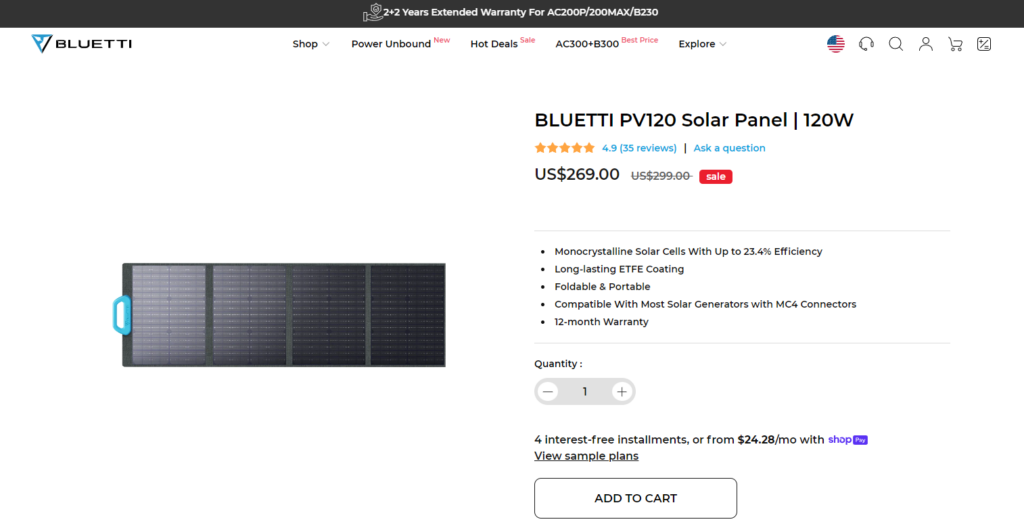
Available on both Amazon and Bluetti’s official website, the Bluetti PV120S Solar Panel is Travel and Leisure’s top choice for camping due to its stellar performance and durability. The monocrystalline solar cells of its four-fold panels boast a remarkable conversion rate of sunlight into solar power at 23.4%. Designed to power portable generators, it can fully charge a small battery in just five hours, providing ample energy for any outdoor adventure. Notably, this model performs exceptionally well in cloudy conditions and even features a unique shading performance feature. It weighs around 15 pounds and comes with built-in kickstands for easy positioning. It has an ETFE coating and an IP65 waterproof rating, meaning it can handle a variety of conditions. It costs around $299 and measures 69 x 22 inches when open and 18 x 21.7 inches when folded.
Topsolar 100W Foldable Portable Solar Panel
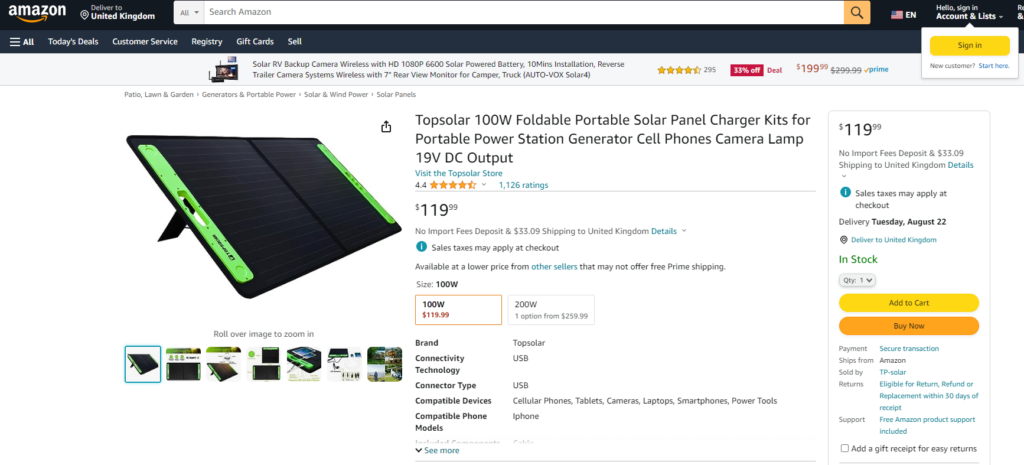
For budget-conscious campers, the Topsolar 100W foldable solar panel is an efficient and portable choice. With six times the wattage of many other models at only double the price, it offers excellent value for money. It’s capable of reaching nearly its full intended wattage, a feat many other models in its price range can’t match. It comes with a kickstand for optimal sun exposure, and it’s portable enough to carry with ease thanks to its folding design and handle. The panel costs around $150 and measures 50.79 x 20.28 x 1 inches when open and 19.98 x 20.28 x 1.38 inches when folded.
Jackery 1000W Peak Solar Generator SG550 with 100W Solar Panel
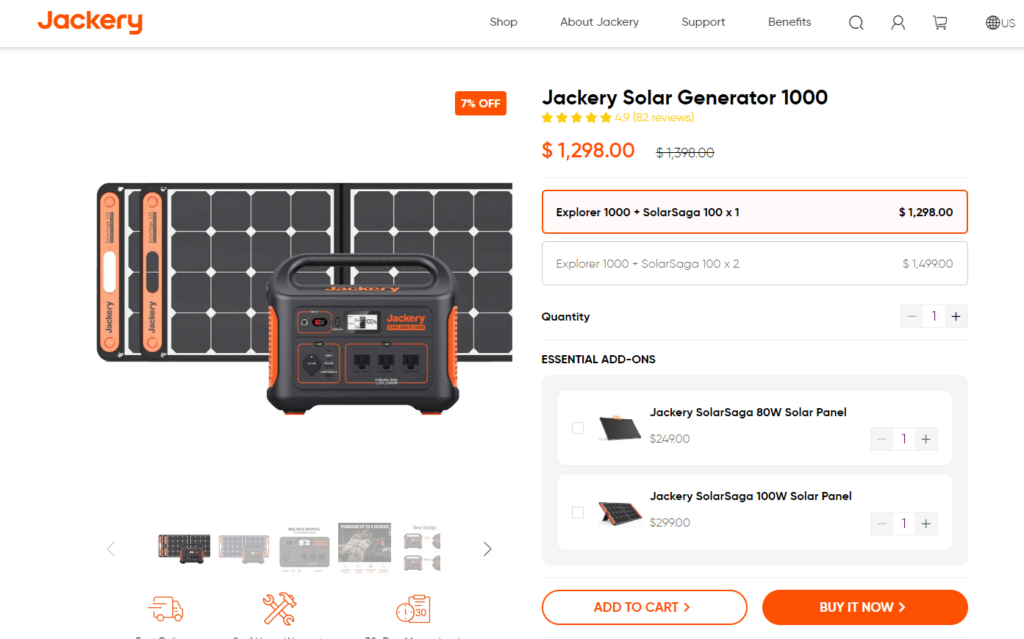
The Jackery 1000W Peak Solar Generator SG550 comes with a 100W Solar Panel that can charge up to seven devices simultaneously, making it the ideal choice for those who need ample power supply. This solar generator is compact, suitable for indoor and outdoor use, and comes with the Solar Saga 100W panel, capable of fully recharging the battery in eight hours. It costs around $749 and measures 22.83 x 19.69 x 2.36 inches when open.
SunJack 15 Watt Foldable ETFE Monocrystalline Solar Panel Charger
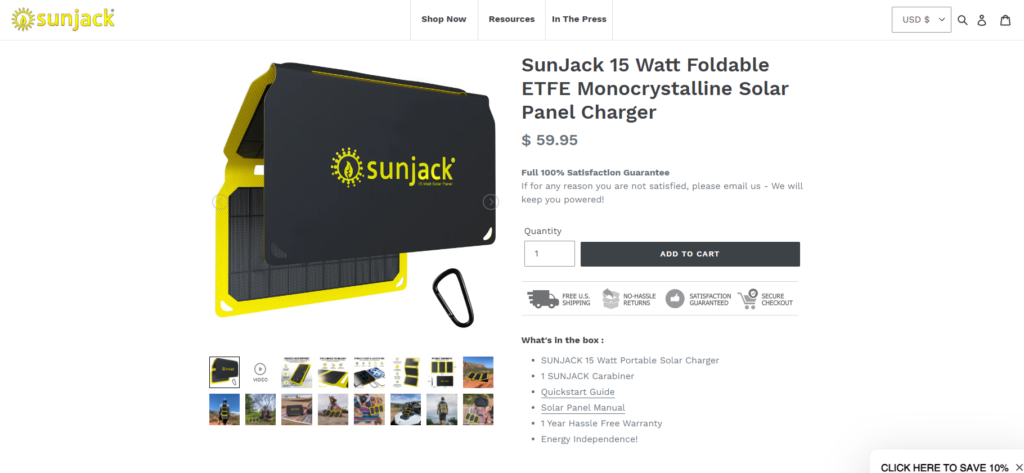
The SunJack 15 Watt Foldable Solar Panel Charger, ideal for charging phones, achieves wall-outlet charging speeds and also features a mesh pocket to prevent your phone from overheating while charging. It’s rugged, weatherproof, and designed for ultimate portability, with the ability to be attached to a backpack via an included carabiner. It costs around $60 and measures 20 x 10.5 x 1 inches when open and 10.5 x 6.5 x 1.2 inches when folded.
Renogy 12 Volt Monocrystalline Portable Foldable Solar Panel
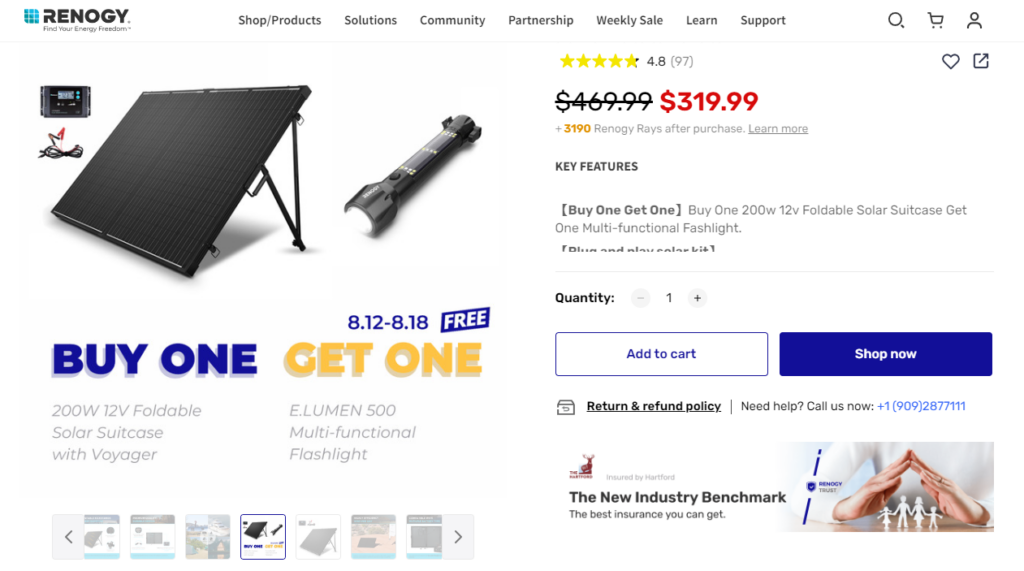
The Renogy 200 Watt 12 Volt Portable Panel is our top suitcase pick due to its durability and convenient carrying case. Weighing over 20 pounds, it’s a sturdy option ideal for setting up camp in windy areas, with a case that protects your panels when not in use. It easily hooks up to 12V batteries to store excess energy. It costs around $450 and measures 50.79 x 20.28 x 1 inches when open and 19.98 x 20.28 x 1.38 inches when folded.
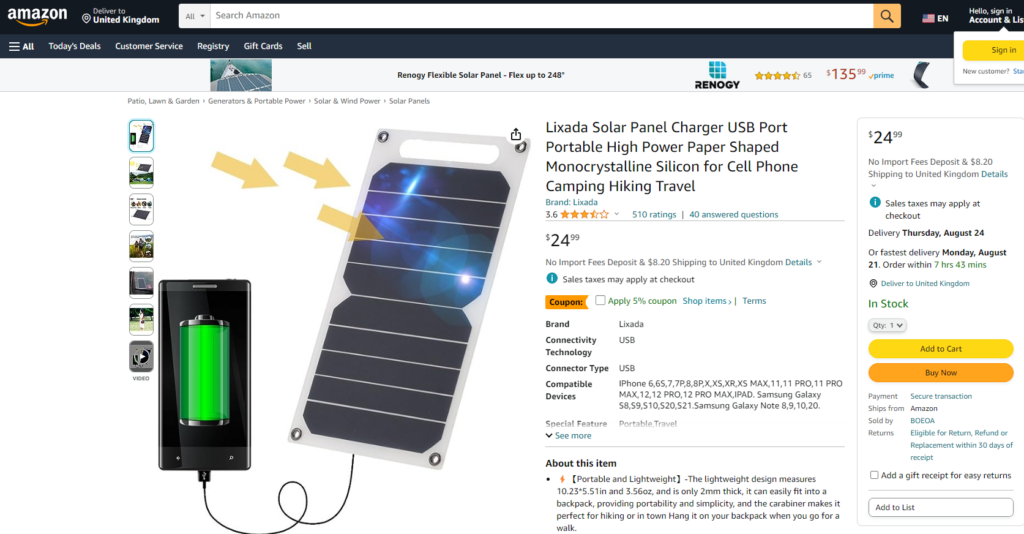
At less than 0.25 pounds, the Lixada Solar Panel Charger is an ultra-lightweight option perfect for backpacking. It can be attached to your backpack via four eyelets, allowing solar charging on the go. It costs around $27 and measures 10.2 x 5.5 x 0.1 inches when open.
Topsolar 100W Foldable Portable Solar Panel
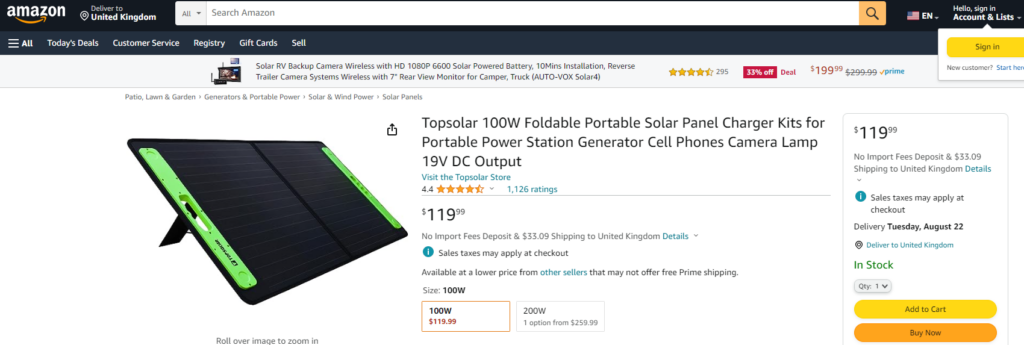
This Topsolar model is a compact, easy-to-carry panel that still offers serious charging capabilities. It can power up portable batteries and directly charge your devices. It costs around $120 and measures 67.08 x 16.1 x 1.3 inches when open and 17.1 x 16 inches when folded.
Goal Zero Ranger 300 Solar Panel Briefcase
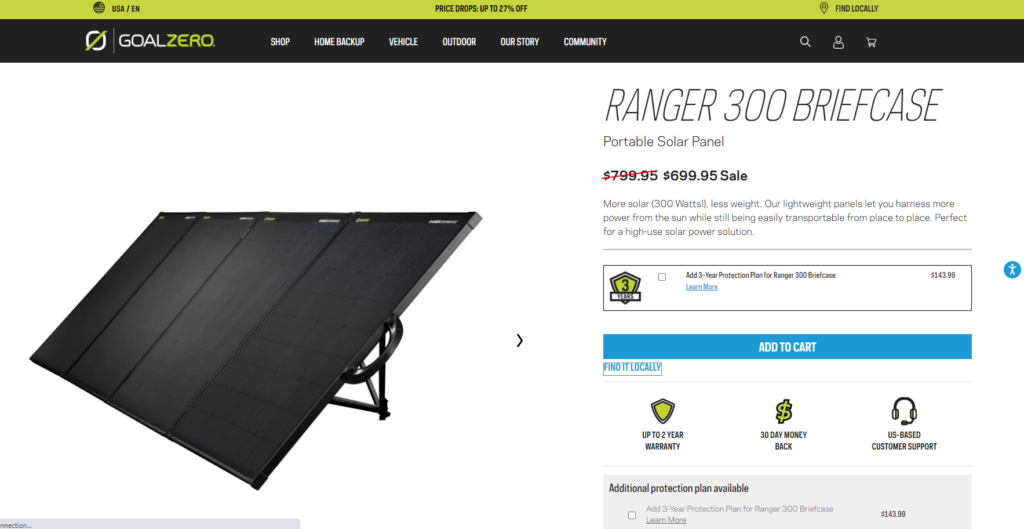
The Goal Zero Ranger 300 Solar Panel Briefcase, boasting a 300W capacity, can rapidly charge a portable power station, subsequently powering your appliances. It folds into a handy briefcase for easy portability and costs around $449. Note that this is the most expensive option on our list.
Using solar panels for camping is not only a practical solution to keep your devices powered in remote areas, but it also brings several additional benefits, including environmental friendliness, ease of use, customizability, and overcharge protection.
Environmental Friendliness: Solar panels are a renewable energy solution that leverages the power of the sun to provide electricity. This is a particularly appealing characteristic for outdoor enthusiasts who value conservation and sustainability. Unlike traditional power generation methods, solar panels produce no harmful emissions during operation. They harness natural sunlight and convert it into useful energy, without the need for burning fossil fuels or creating waste. This is an impactful way of reducing your carbon footprint and promoting environmental stewardship during your camping trips.
Ease of Use: Solar panels for camping are designed to be user-friendly and adaptable to various settings. Most solar panels are relatively easy to set up – you can install them anywhere within your camping space that gets enough sunlight, whether that’s inside your tent, near trees, or atop your vehicle. Once installed and exposed to sunlight, a quality solar panel can begin charging your devices within minutes. Some panels also feature convenient design aspects like kickstands for propping up at an angle, or handles for easy carrying, further enhancing their usability.
Customizability: One of the great advantages of solar panels is their flexibility and versatility. You can choose from different types (such as rigid, portable, foldable or solar generators) and capacities, depending on your specific needs and circumstances. Whether you require a small panel just to keep your phone charged, or a larger setup to power multiple devices, you can customize your solar solution accordingly. This ensures you’ll have a reliable power source tailored to your needs, wherever your camping adventures may lead you.
Overcharge Protection: Safety is a significant aspect to consider when using any power source, and solar panels are no exception. Many portable solar panels come equipped with charge controllers, a crucial component that manages the power going into your devices or batteries. These controllers prevent overcharging, which can damage or even destroy your equipment. This feature not only safeguards your devices but also extends their lifespan, offering peace of mind when you rely on solar energy for your power needs while camping.
Solar panels, though useful, can be dependent on the weather conditions. On cloudy or rainy days, their efficiency may drop, causing potential power issues. They also require a clear, open space to operate optimally, which may not always be available in densely wooded camping areas. Finally, while portable solar panels have come a long way, they are still an investment compared to traditional power sources.
Solar panels for camping are an incredibly beneficial asset for outdoor enthusiasts. Not only do they provide a reliable source of power for your electronic devices in off-grid areas, but they also offer a sustainable and environmentally friendly power solution. From the various types of panels, such as rigid, portable, or solar generators, to factors like power output, size, weight, durability, and ease of use, there are multiple aspects to consider when choosing the right solar panel for your camping needs. It’s essential to understand your power requirements, plan the setup location, and consider how you’ll transport the panels. Moreover, solar panels provide distinct advantages like customizability and overcharge protection. By carefully considering your needs and the options available, you can find a solar panel setup that significantly enhances your camping experience while contributing positively to the environment. Happy camping and sun-soaking!
Consider the power output, size and weight, durability, and ease of use. Additionally, understand your energy needs based on the devices you plan to charge.
Yes, solar panels are typically easy to install and use in a camping setting, often only requiring exposure to direct sunlight to start charging your devices.
Yes, portable solar panels are often lightweight and compact, making them ideal for hikers or backpackers.
Stay a while and read more posts like this
In recent years, Europe has witnessed a remarkable surge in the adoption of solar panels, marking a pivotal shift towards renewable energy. Data from the...
Renewable Energy, Solar Energy, Solar Energy Basics, Solar Technology
“Unlock the Truth: Get the Facts on Solar Energy!” Introduction Solar energy is becoming increasingly popular as a renewable energy source, but there are...
Imagine a world where you’re able to cut your monthly energy expenditure substantially. A reality where your home isn’t reliant on finite,...